Ray KurzweilDies ist keine offizielle Homepage von Ray Kurzweil, E-Mails an Ray Kurzweil sind hier nicht möglich! |
 5 Bücher von Ray Kurzweil
5 Bücher von Ray Kurzweil 
 3 Texte von Ray Kurzweil
3 Texte von Ray Kurzweil 
| Jahr | Volltext | Abrufe | Text | Texttyp |
|---|---|---|---|---|
| 6, 4, 1, 6, 5, 5, 4, 5, 4, 5, 7, 1 | Reflections on Stephen Wolfram's 'A New Kind of Science' (Ray Kurzweil) | Text | ||
| 2001 |   |
1, 1, 6, 3, 3, 9, 4, 2, 4, 8, 3, 6 | The Law of Accelerating Returns (Ray Kurzweil) erschienen in Alan Turing (Seite 381 - 415) | Text |
| 2001 |   |
3, 4, 6, 4, 5, 2, 3, 1, 4, 5, 3, 3 | Der Griff nach dem Gehirn (Ray Kurzweil) erschienen in Erinnern und Vergessen (Seite 51 - 56)  | Text |
 Definitionen von Ray Kurzweil
Definitionen von Ray Kurzweil
Von Ray Kurzweil gibt es im Biblionetz insgesamt 24 Definitionen zu den Begriffen Algorithmus, Bewusstsein, Biologie, Chaos, Chaostheorie, Computer, Digitalisierung, Entropie, Evolution, Expertensystem, General Problem Solver (GPS), Gödelsches Theorem, Konnektivismus, Künstliche Intelligenz (KI / AI), Künstliches Leben (Artificial life), Kybernetik, Leben, Rekursion, SHRDLU, Turing-Maschine, Turing-Test, Watson
 Bemerkungen von Ray Kurzweil
Bemerkungen von Ray Kurzweil
Von Ray Kurzweil gibt es im Biblionetz Bemerkungen zu:
 Bücher KB IB clear | The Age of Spiritual Machines, The Singularity Is Near, The Society of Mind |
 Texte KB IB clear | A New Form of Intelligence on Earth, An Inexoarable Emergence, Building New Brains..., Of Mind and Machine, The Intelligence of Evolution, The Law of Accelerating Returns, The Law of Time and Chaos |
 Fragen KB IB clear | Können Computer denken?Can computers think? |
 Begriffe KB IB clear | cogito ergo sum, Evolutionevolution, Technik, Turing-Testturing test, Verstehenunderstanding, Watson |
 Zeitleiste
Zeitleiste
 Zitationsnetz
Zitationsnetz 
 Begriffswolke von Ray Kurzweil
Begriffswolke von Ray Kurzweil
 Zitate von Ray Kurzweil
Zitate von Ray Kurzweil
Technik ist die Fortsetzung der Evolution mit anderen Mitteln.
von Ray Kurzweil im Buch Erinnern und Vergessen (2001) im Text Der Griff nach dem Gehirn auf Seite 55 8 Vorträge von Beat mit Bezug
8 Vorträge von Beat mit Bezug
- 0 und 1 aber nicht schwarz/weiss
Der Leitmedienwechsel und das Schweizerische Bildungswesen
GDI Rüschlikon, 12.03.2013
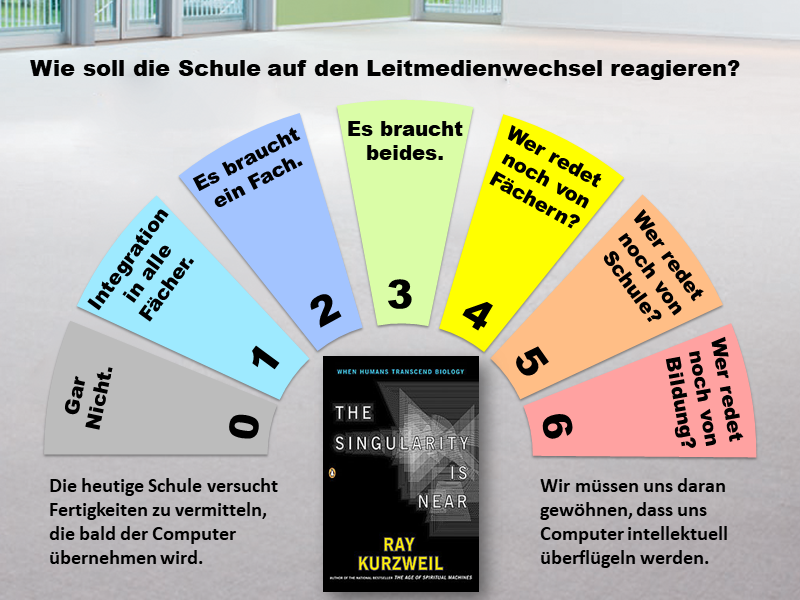
- Warum machen wir das alles?
Gedanken zum Leitmedienwechsel an Gymnasien
Gymnasium Immensee, 06.04.2013
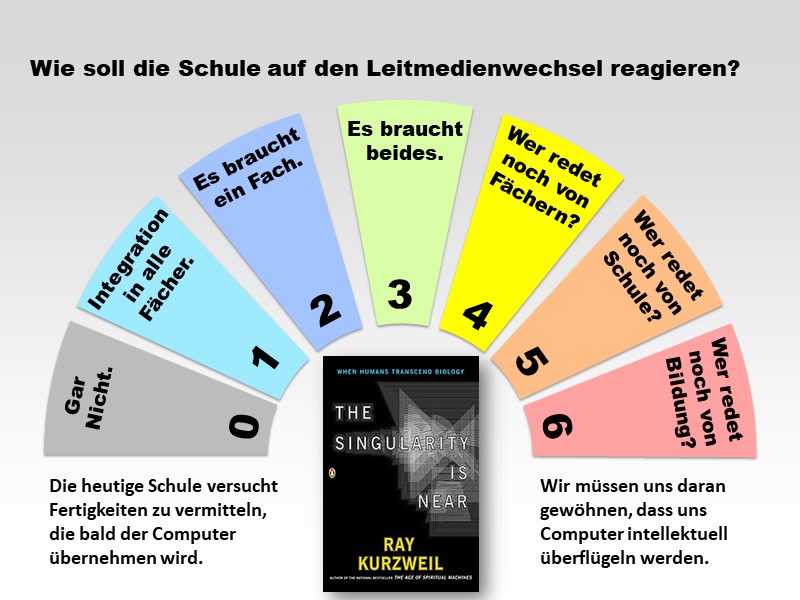
- Ist JavaScript das neue Latein?
Warum und welche Informatik in die Schule gehört
30 Jahre Jubiläum SI, Fribourg, 25.06.2013
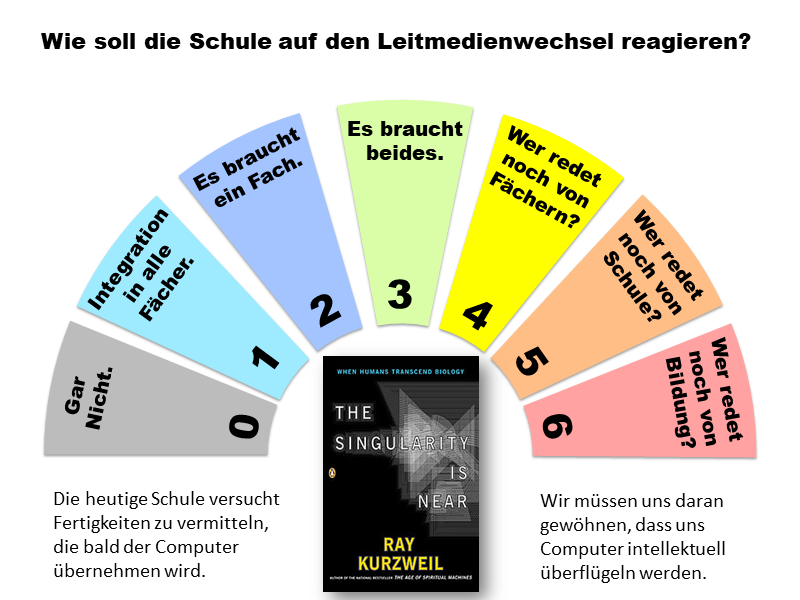
- Leitmedienwechsel und Motivation
Interne Weiterbildung Kollegium Schwyz
Bad Ragaz, 16.08.2013
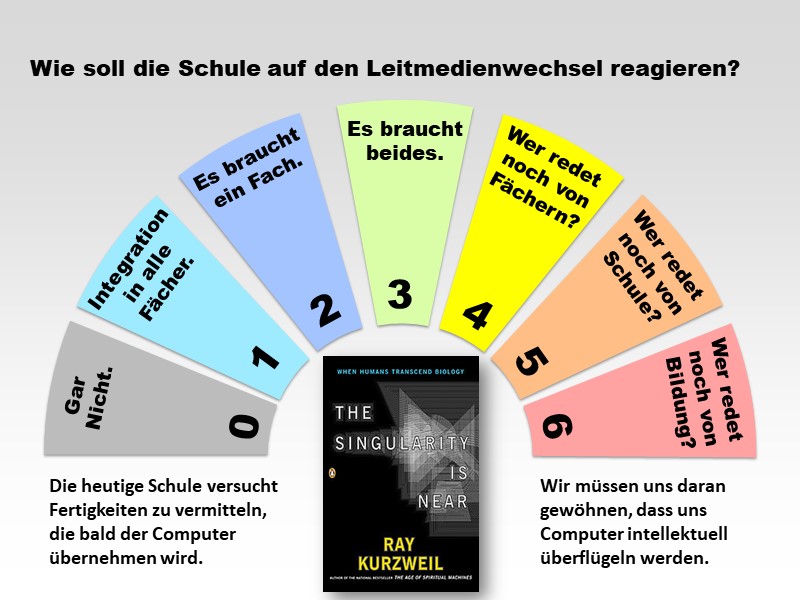
- Informatik ist mehr als Informatik
Warum sich die Informatik mit dem Leitmedienwechsel befassen muss
Eröffnungsvortrag an der INFOS 2013, 26.09.2013
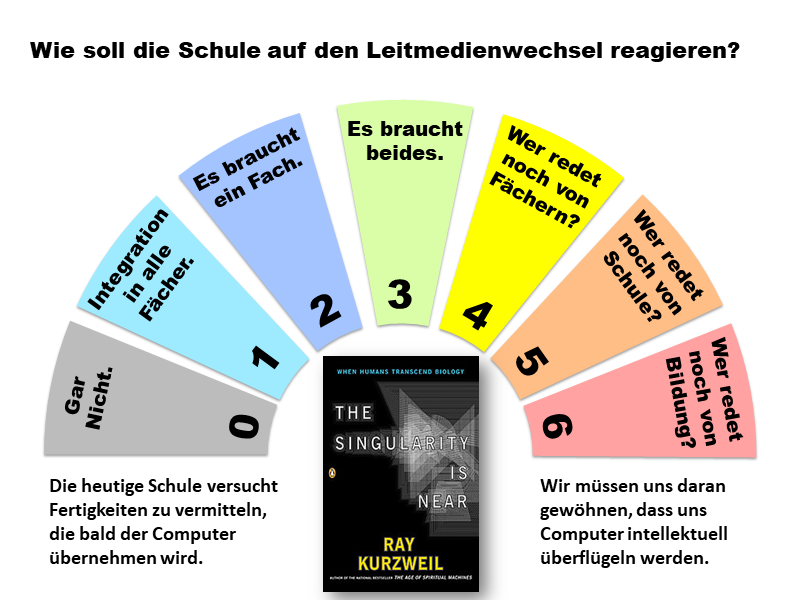
- Die Schule renovieren
Interne Weiterbildung der Primarschule Brunnen
Brunnen, 05.03.2014
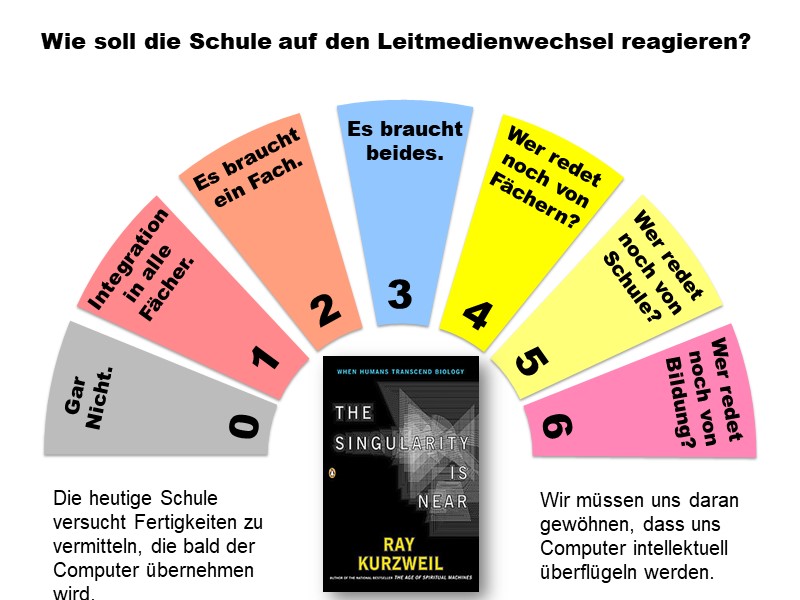
- Fachfrau / Fachmann Leitmedienwechsel BFS
Berufsbildungszentrum BBZ Päffikon, 13.08.2014
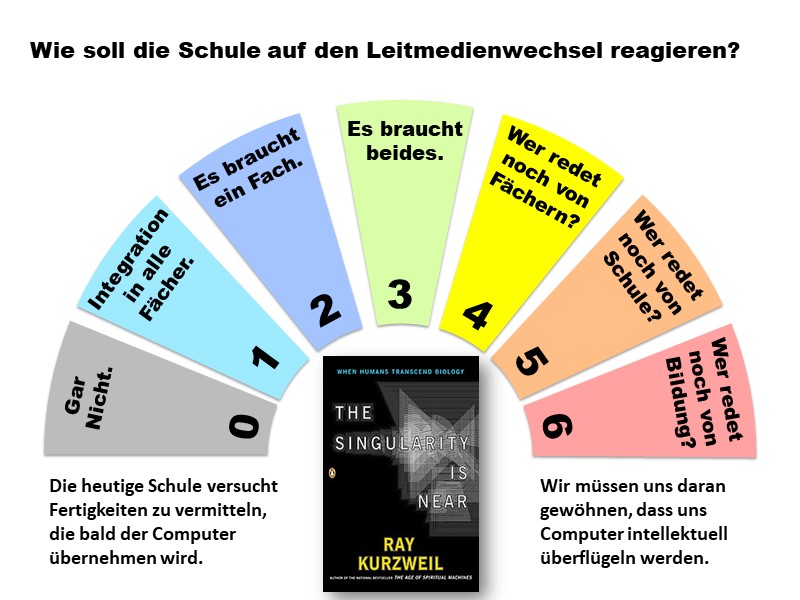
- mit - über - trotz
IMST-Tagung 2017, Wien, 17.03.2017
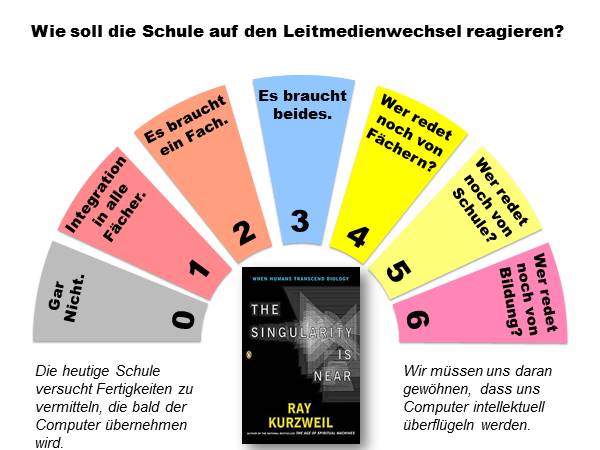
 Einträge in Beats Blog
Einträge in Beats Blog
 Zitationsgraph
Zitationsgraph
 Zitationsgraph (Beta-Test mit vis.js)
Zitationsgraph (Beta-Test mit vis.js)
 141 Erwähnungen
141 Erwähnungen 
- Reflections on Stephen Wolfram's 'A New Kind of Science' (Ray Kurzweil)
- Mind as Machine - A History of Cognitive Science (Margaret A. Boden)

- The End of Work - The Decline of the Global Labor Force and the Dawn of the Post-Market Era (Jeremy Rifkin) (1995)

- Theories of the Information Society - 4th Edition (Frank Webster) (1995)

- Understanding Intelligence (Rolf Pfeifer, Christian Scheier) (1999)


- The Age of Spiritual Machines - When Computers Exceed Human Intelligence (Ray Kurzweil) (1999)

- LOG IN 2/1999 (1999)

- Können Computer denken? - Oder: Wonach genau fragt man eigentlich, wenn man fragt, ob Computer denken können? (Reinhard Golecki) (1999)

- Können Computer denken? - Oder: Wonach genau fragt man eigentlich, wenn man fragt, ob Computer denken können? (Reinhard Golecki) (1999)
- The Religion of Technology - The Divinity of Man and the Spirit of Invention (David F. Noble) (1999)

- Children and Computer Technology - Volume 10, Number 2 - Fall/Winter 2000 of "The Future of Children" (2000)

- 5. Use of Computer Technology to Help Students with Special Needs

- 5. Use of Computer Technology to Help Students with Special Needs
- Die Mär von den intelligenten Monstern (Rolf Pfeifer) (2001)


- bits and spaces - architecture and computing for physical, virtual, hybrid realms; 33 projects by architecture and CAAD, ETH Zurich (Maia Engeli) (2001)

- Emergence - The Connected Lives of Ants, Brains, Cities, and Software (Steven Johnson) (2001)

- Erinnern und Vergessen - Blackbox Gedächtnis - NZZ Folio 12/01 (2001)

- Der technischen Zivilisation gewachsen bleiben - Nachdenken über die neuen Medien und das gar nicht mehr allmähliche Verschwinden der Wirklichkeit (Hartmut von Hentig) (2002)


- Wozu Systeme? (Dirk Baecker) (2002)


- Leonardo's Laptop - Human Needs and the New Computing Technologies (Ben Shneiderman) (2002)


- Alan Turing - Life and Legacy of a Great Thinker (Christof Teuscher) (2003)
- The Singularity Is Near - when humans transcend biology (Ray Kurzweil) (2005)

- Radical Evolution - The Promise and Peril of Enhancing Our Minds, Our Bodies - and What It Means to Be Human (Joel Garreau) (2006)

- FutureHype - The Myths Of Technology Change (Bob Seidensticker) (2006)


- 1. The Birthday Present Syndrome
- 2. The Perils of Prediction

- 5. More Powerful than a Locomotive

- Das Management der Ignoranz - Nichtwissen als Erfolgsfaktor (Ursula Schneider) (2006)

- Informal Learning - Rediscovering the Natural Pathways That Inspire Innovation and Performance (Jay Cross) (2006)


- How the Body Shapes the Way We Think - A New View of Intelligence (Rolf Pfeifer, Josh Bongard) (2006)

- Proust and the Squid - The Story and Science of the Reading Brain (Maryanne Wolf) (2007)

- The Allure of Machinic Life - Cybernetics, Artificial Life, and the New AI (Bradford Books) (John Johnston) (2008)

- Gibt es eine 'Net Generation'? (Rolf Schulmeister) (2008)


- Wired for Innovation - How Information Technology Is Reshaping the Economy (Erik Brynjolfsson, Adam Saunders) (2009)

- Lehrmittel - BZL, 28. Jahrgang Heft 1/2010 (Anni Heitzmann, Alois Niggli) (2010)
- Neue Medien - Neue Lehrmittel? - Potenziale und Herausforderungen bei der Entwicklung digitaler Lehr- und Lernmedien (Dominik Petko)


- Neue Medien - Neue Lehrmittel? - Potenziale und Herausforderungen bei der Entwicklung digitaler Lehr- und Lernmedien (Dominik Petko)
- Schöpfung ausser Kontrolle - Wie Technik uns benutzt (Karl Olsberg) (2010)

- The Innovator's Way - Essential Practices for Successful Innovation (Peter Denning, Robert Dunham) (2010)

- Medienwelt von morgen - Herausforderung für heute (Thomas Merz) (2010)


- The Semantic Sphere - Computation, Cognition and Information Economy (Pierre Lévy) (2011)


- Visual Complexity - Mapping Patterns of Information (Manuel Lima) (2011)

- Technology and the Spirit (Ignacio L. Götz) (2011)

- Race Against The Machine - How the Digital Revolution is Accelerating Innovation, Driving Productivity, and Irreversibly Transforming Employment and the Economy (Erik Brynjolfsson, Andrew McAfee) (2011)

- 1. Technology’s Influence on Employment and the Economy
- 2. Humanity and Technology on the Second Half of the Chessboard
- Transformative Approaches to New Technologies and Student Diversity in Futures Oriented Classrooms - Future Proofing Education (Leonie Rowan, Chris Bigum) (2012)

- 3. Edges, Exponentials and Education - Disenthralling the Digital (Chris Bigum)


- 3. Edges, Exponentials and Education - Disenthralling the Digital (Chris Bigum)
- Das Megatrend-Prinzip - Wie die Welt von morgen entsteht (Matthias Horx) (2012)

- Robots Will Steal Your Job, But That's OK - how to survive the economic collapse and be happy (Frederico Pistono) (2012)

- Critics of Digitalisation - Warners, Sceptics, Scaremongers, Apocalypticists - 20 Portraits (Otto Peters) (2012)


- The Engine of Complexity - Evolution as Computation (John E. Mayfield) (2013)

- The Maker Movement Manifesto - Rules for Innovation in the New World of Crafters, Hackers, and Tinkerers (Mark Hatch) (2013)

- Das iPhone ist halt keine Dampfmaschine (Philipp Löpfe) (2013)

- The Future - Six Drivers of Global Change (Al Gore) (2013)

- Present Shock - When Everything Happens Now (Douglas Rushkoff) (2013)

- The New Digital Age - Reshaping the Future of People, Nations and Business (Eric Schmidt, Jared Cohen) (2013)

- The Second Machine Age - Work, Progress, and Prosperity in a Time of Brilliant Technologies (Erik Brynjolfsson, Andrew McAfee) (2014)


- 3. Das Moore'sche Gesetz und die zweite Hälfte des Schachbretts
- Our Final Invention - Artificial Intelligence and the End of the Human Era (James Barrat) (2014)
- The Naked Future - What Happens in a World That Anticipates Your Every Move? (Patrick Tucker) (2014)

- 2. The Signal from Within
- Die analoge Revolution - Wenn Technik lebendig wird und die Natur mit dem Internet verschmilzt (Christian Schwägerl) (2014)

- How We Got to Now - Six Innovations That Made the Modern World (Steven Johnson) (2014)

- Silicon Valley - Was aus dem mächtigsten Tal der Welt auf uns zukommt (Christoph Keese) (2014)


- Die granulare Gesellschaft - Wie das Digitale unsere Wirklichkeit auflöst (Christoph Kucklick) (2014)

- The Master Algorithm - How the Quest for the Ultimate Learning Machine Will Remake Our World (Pedro Domingos) (2015)

- Beyond Zero and One (Andrew Smart) (2015)

- Great Principles of Computing (Peter Denning, Craig Martell) (2015)


- Digital Sociology (Deborah Lupton) (2015)

- The Technological Singularity (Murray Shanahan) (2015)

- Das Morgen-Land (Thomas Schulz) (2015)

- Cyber-Proletariat - Global Labour in the Digital Vortex (Nick Dyer-Witheford) (2015)

- Homo Deus - Eine Geschichte von Morgen (Yuval Noah Harari) (2015)

- The Future of the Professions - How Technology Will Transform the Work of Human Experts (Richard Susskind, Daniel Susskind) (2016)

- Cyberpsychologie - Leben im Netz: Wie das Internet uns verändert (Catarina Katzer) (2016)

- Only Humans Need Apply - Winners and Losers in the Age of Smart Machines (Thomas H. Davenport, Julia Kirby) (2016)

- Ich hasse dieses Internet (Jarett Kobek) (2016)


- Mehr als 0 und 1 - Schule in einer digitalisierten Welt (Beat Döbeli Honegger) (2016)


- CyberPlaces - Philosophische Annäherungen an den virtuellen Ort (Tobias Holischka) (2016)

- Redefreiheit - Prinzipien für eine vernetzte Welt (Timothy Garton Ash) (2016)

- Digitales Wissen. Daten und Überwachung (Thomas Christian Bächle) (2016)

- Die Gesellschaft der Singularitäten - Zum Strukturwandel der Moderne (Andreas Reckwitz) (2017)

- Tomorrow's Learning: Involving Everyone. Learning with and about Technologies and Computing - 11th IFIP TC 3 World Conference on Computers in Education, WCCE 2017, Dublin, Ireland, July 3-6, 2017 (Arthur Tatnall, Mary Webb) (2017)


- 9. Large Effect Size Studies of Computers in Schools - Calculus for Kids and Science-ercise (Andrew Fluck, Dev Ranmuthugala, C. K. H. Chin, Irene Penesis, Jacky Chong, Yang Yang)


- 9. Large Effect Size Studies of Computers in Schools - Calculus for Kids and Science-ercise (Andrew Fluck, Dev Ranmuthugala, C. K. H. Chin, Irene Penesis, Jacky Chong, Yang Yang)
- Life 3.0 - Being Human in the Age of Artificial Intelligence (Max Tegmark) (2017)


- Origin (Dan Brown) (2017)

- Der Sinn des Denkens (Markus Gabriel) (2018)


- Schnelles Lesen, langsames Lesen - Warum wir das Bücherlesen nicht verlernen dürfen (Maryanne Wolf) (2018)

- Artificial Unintelligence (Meredith Broussard) (2018)

- Art education in the post-digital era - Experiential construction of knowledge through creative coding (Tomi Slotte Dufva) (2018)


- Metaphors of code - Structuring and broadening the discussion on teaching children to code (Tomi Slotte Dufva, Mikko Dufva) (2016)


- Metaphors of code - Structuring and broadening the discussion on teaching children to code (Tomi Slotte Dufva, Mikko Dufva) (2016)
- The Fourth Education Revolution (Anthony Seldon, Oladimeji Abidoye) (2018)


- Jäger, Hirten, Kritiker - Eine Utopie für die digitale Gesellschaft (Richard David Precht) (2018)

- Team Human (Douglas Rushkoff) (2019)

- Artificial You - AI and the Future of Your Mind (Susan Schneider) (2019)

- Computational Thinking (Peter Denning, Matti Tedre) (2019)


- 9. Future Computation
- Ansturm der Algorithmen - Die Verwechslung von Urteilskraft mit Berechenbarkeit (Wolf Zimmer) (2019)


- How to Speak Machine - Computational Thinking for the Rest of Us (John Maeda) (2019)

- AI Ethics (Mark Coeckelbergh) (2020)

- What is AI Literacy? - Competencies and Design Considerations (Duri Long, Brian Magerko) (2020)



- Lesen im digitalen Zeitalter (Gerhard Lauer) (2020)


- Digitalisierung, Künstliche Intelligenz und Robotik - Eine Einführung für Schule und Unterricht (Inez De Florio-Hansen) (2020)

- The Myth Of Artificial Intelligence - Why Computers Can’t Think The Way We Do (Erik J. Larson) (2021)

- God, Human, Animal, Machine - Technology, Metaphor, and the Search for Meaning (Meghan O'Gieblyn) (2021)
- Framers - Human Advantage in an Age of Technology and Turmoil (Kenneth Cukier, Viktor Mayer-Schönberger, Francis de Véricourt) (2021)


- New Work braucht New Learning - Eine Perspektivreise durch die Transformation unserer Organisations- und Lernwelten (Jan Foelsing, Anja Schmitz) (2021)


- Ein Teil des Ganzen - Perspektiven auf unser Umfeld im Wandel


- Ein Teil des Ganzen - Perspektiven auf unser Umfeld im Wandel
- Was ist Digitalität? (Uta Hauck-Thum, Jörg Noller) (2021)


- 2. Analog oder digital? - Philosophieren nach dem Ende der Philosophie (Walter Chr. Zimmerli)


- 2. Analog oder digital? - Philosophieren nach dem Ende der Philosophie (Walter Chr. Zimmerli)
- Der Wert der Digitalisierung - Gemeinwohl in der digitalen Welt (Chris Piallat) (2021)


- Klick - Wie wir in einer digitalen Welt die Kontrolle behalten und die richtigen Entscheidungen treffen (Gerd Gigerenzer) (2021)

- Pädagogisches Wissen im Lichte digitaler und datengestützter Selbstoptimierung (Estella Ferraro, Sabrina Schröder, Christiane Thompson) (2021)


- Digitalität - Zur Philosophie der digitalen Lebenswelt (Jörg Noller) (2022)

- Machine Learning for Teachers - Evaluation und Entwicklung von Lehr- und Lernmaterialien zum Thema Künstliche Intelligenz für Lehrpersonen ab Sekundarstufe 1 (Thomas Zurfluh) (2022)

- Algorithmen und Autonomie - Interdisziplinäre Perspektiven auf das Verhältnis von Selbstbestimmung und Datenpraktiken (Dan Verständig, Christina Kast, Janne Stricker, Andreas Nürnberger) (2022)


- Geist in der Maschine - Über Bildung, Schein und Wahrheit im Digitalzeitalter (Thomas Damberger)

- Geist in der Maschine - Über Bildung, Schein und Wahrheit im Digitalzeitalter (Thomas Damberger)
- Mensch, Maschine, Identität - Ethik der Künstlichen Intelligenz (Orlando Budelacci) (2022)


- DELFI 2022 - Die 20. Fachtagung Bildungstechnologien der Gesellschaft für Informatik e.V. (Peter A. Henning, Michael Striewe, Matthias Wölfel) (2022)


- Lernen im Zeitalter der Digitalisierung - Einblicke und Handlungsempfehlungen für die neue Arbeitswelt (Mark Harwardt, Peter F.-J. Niermann, Andre M. Schmutte, Axel Steuernagel) (2023)


- Menschliches Gehirn trifft auf Künstliche Intelligenz - Die Implikationen für Veränderungsfähigkeit und betriebliche Transformationsprozesse (Ulrich Lenz)


- Menschliches Gehirn trifft auf Künstliche Intelligenz - Die Implikationen für Veränderungsfähigkeit und betriebliche Transformationsprozesse (Ulrich Lenz)
- You & AI - Alles über Künstliche Intelligenz und wie sie unser Leben prägt (Anne Scherer, Cindy Candrian) (2023)

- 1. Hallo! - Hier ist KI
- Power and Progress - Our Thousand-Year Struggle Over Technology and Prosperity (Daron Acemoglu, Simon Johnson) (2023)

- Proompting is Computational Thinking (Alexander Repenning, Susan Grabowski) (2023)


- The Future of AI in Education - 13 Things We Can Do to Minimize the Damage (Arran Hamilton, Dylan Wiliam, John Hattie) (2023)


- The Coming Wave - Technology, Power, and the Twenty-first Century's Greatest Dilemma (Mustafa Suleyman, Michael Bhaskar) (2023)

- Künstliche Intelligenz, Large Language Models, ChatGPT und die Arbeitswelt der Zukunft (Michael Seemann) (2023)


- Zwischen Macht und Mythos - Eine kritische Einordnung aktueller KI-Narrative (Rainer Rehak) (2023)


- Finnish 5th and 6th graders’ misconceptions about artificial intelligence (Pekka Mertala, Janne Fagerlund) (2024)


- Education for the Age of AI (Charles Fadel, Alexis Black, Robbie Taylor, Janet Slesinski, Katie Dunn) (2024)

- The Simple Macroeconomics of AI (Daron Acemoglu) (2024)


- The Atomic Human - Understanding Ourselves in the Age of AI (Neil D. Lawrence) (2024)

- The Singularity is nearer (Ray Kurzweil) (2024)

- 2. Reinventing Intelligence
- 3. Who am I?
- 4. Life is getting exponentially better
- Nexus - Eine kurze Geschichte der Informationsnetzwerke von der Steinzeit bis zur künstlichen Intelligenz (Yuval Noah Harari) (2024)

 Volltexte
Volltexte
 |  The Law of Accelerating Returns: Artikel als Volltext ( The Law of Accelerating Returns: Artikel als Volltext ( : :  , 732 kByte; , 732 kByte;  : :  2021-03-21) 2021-03-21) |
 | Die Intelligenz der Evolution. Wie Mensch und Computer verschmelzen: Gesamtes Buch als Volltext ( : 2154 kByte) : 2154 kByte) |
 | How to Create a Mind: Gesamtes Buch als Volltext ( : 1959 kByte) : 1959 kByte) |
 | How to Create a Mind: Gesamtes Buch als Volltext ( : 5702 kByte) : 5702 kByte) |
 | The Age of Intelligent Machines: Gesamtes Buch als Volltext ( : :  , 32670 kByte) , 32670 kByte) |
 | The Age of Spiritual Machines: Gesamtes Buch als Volltext ( : 3267 kByte) : 3267 kByte) |
 | The Singularity Is Near: Gesamtes Buch als Volltext ( : 4412 kByte) : 4412 kByte) |
 | The Singularity Is Near: Gesamtes Buch als Volltext ( : :  , 1999 kByte) , 1999 kByte) |
 | The Singularity is nearer: Gesamtes Buch als Volltext ( : 13961 kByte) : 13961 kByte) |
 | What is AI, Anyway?: Artikel als Volltext ( : :  , 605 kByte) , 605 kByte) |
 |  Der Griff nach dem Gehirn: Artikel als Volltext ( Der Griff nach dem Gehirn: Artikel als Volltext ( : 24 kByte; : 24 kByte;  : :  Link unterbrochen? Letzte Überprüfung: 2021-03-21 Letzte erfolgreiche Überprüfung: 2017-06-28) Link unterbrochen? Letzte Überprüfung: 2021-03-21 Letzte erfolgreiche Überprüfung: 2017-06-28) |
 |  Building New Brains...: Artikel als Volltext ( Building New Brains...: Artikel als Volltext ( : :  , 63 kByte; , 63 kByte;  : :  Link unterbrochen? Letzte Überprüfung: 2020-11-28 Letzte erfolgreiche Überprüfung: 2019-01-28) Link unterbrochen? Letzte Überprüfung: 2020-11-28 Letzte erfolgreiche Überprüfung: 2019-01-28) |
 |  2009: Artikel als Volltext ( 2009: Artikel als Volltext ( : :  , 30 kByte; , 30 kByte;  : :  Link unterbrochen? Letzte Überprüfung: 2020-11-28 Letzte erfolgreiche Überprüfung: 2019-01-28) Link unterbrochen? Letzte Überprüfung: 2020-11-28 Letzte erfolgreiche Überprüfung: 2019-01-28) |
 |  An Inexoarable Emergence: Artikel als Volltext ( An Inexoarable Emergence: Artikel als Volltext ( : :  , 19 kByte; , 19 kByte;  : :  Link unterbrochen? Letzte Überprüfung: 2020-11-28 Letzte erfolgreiche Überprüfung: 2019-01-28) Link unterbrochen? Letzte Überprüfung: 2020-11-28 Letzte erfolgreiche Überprüfung: 2019-01-28) |
 Externe Links
Externe Links
 |  The Law Of Time And Chaos: Artikel als Volltext ( The Law Of Time And Chaos: Artikel als Volltext ( : :  , 56 kByte; , 56 kByte;  : :  Link unterbrochen? Letzte Überprüfung: 2020-11-28 Letzte erfolgreiche Überprüfung: 2019-01-28) Link unterbrochen? Letzte Überprüfung: 2020-11-28 Letzte erfolgreiche Überprüfung: 2019-01-28) |
 The Age of Spiritual Machines: Website zum Buch ( The Age of Spiritual Machines: Website zum Buch (  : :  Link unterbrochen? Letzte Überprüfung: 2020-11-28 Letzte erfolgreiche Überprüfung: 2019-01-28) Link unterbrochen? Letzte Überprüfung: 2020-11-28 Letzte erfolgreiche Überprüfung: 2019-01-28) |














 Biblionetz-History
Biblionetz-History